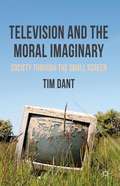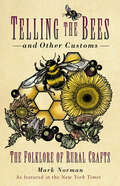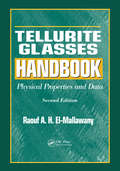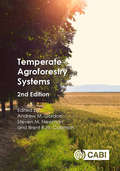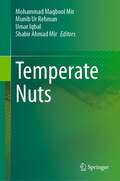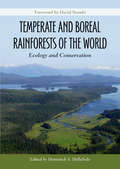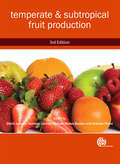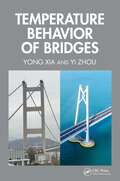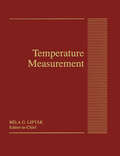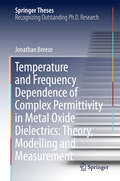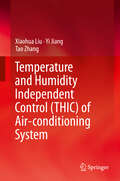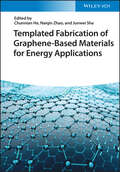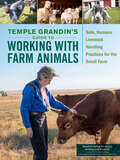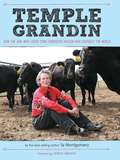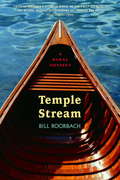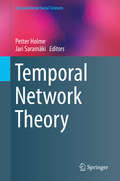- Table View
- List View
Television and the Moral Imaginary
by Tim DantJust how bad is television? Drawing on a range of theoretical sources including Husserl Lacan, Lefebvre, Sartre, Schutz and Adam Smith, this book takes a phenomenological approach to the small screen to offer an original sociological approach to television and its contribution to moral culture of late modern societies.
Television as Digital Media
by James Bennett Niki StrangeIn Television as Digital Media, scholars from Australia, the United Kingdom, and the United States combine television studies with new media studies to analyze digital TV as part of digital culture. Taking into account technologies, industries, economies, aesthetics, and various production, user, and audience practices, the contributors develop a new critical paradigm for thinking about television, and the future of television studies, in the digital era. The collection brings together established and emerging scholars, producing an intergenerational dialogue that will be useful for anyone seeking to understand the relationship between television and digital media. Introducing the collection, James Bennett explains how television as digital media is a non-site-specific, hybrid cultural and technological form that spreads across platforms such as mobile phones, games consoles, iPods, and online video services, including YouTube, Hulu and the BBC's iPlayer. Television as digital media threatens to upset assumptions about television as a mass medium that has helped define the social collective experience, the organization of everyday life, and forms of sociality. As often as we are promised the convenience of the television experience "anytime, anywhere," we are invited to participate in communities, share television moments, and watch events live. The essays in this collection demonstrate the historical, production, aesthetic, and audience changes and continuities that underpin the emerging meaning of television as digital media. Contributors. James Bennett, William Boddy, Jean Burgess, John Caldwell, Daniel Chamberlain, Max Dawson, Jason Jacobs, Karen Lury, Roberta Pearson, Jeanette Steemers, Niki Strange, Julian Thomas, Graeme Turner
Television: The Small Box that Changed the World (World History)
by Katie KawaIt is sometimes said that we are living in a Golden Age of television. What does that mean, and how did we get there? Readers find the answers as they trace the history of television, from its invention to the current age of Peak TV. <p><p> This fascinating story is presented to readers through informative main text, annotated quotations, detailed sidebars, primary sources, and a comprehensive timeline. Television has changed nearly every aspect of life in many countries, and readers are sure to be excited by this fun and fact-filled look at how history and television have influenced each other.
Telling the Bees and Other Customs: The Folklore of Rural Crafts
by Mark NormanThroughout the history of civilisation, traditional crafts have been passed down from hand to skilled hand. Blacksmithing, brewing, beekeeping, baking, milling, spinning, knitting and weaving: these skills held societies together, and so too shaped their folklore and mythology.Exploring the folklore connected with these rural crafts, Telling the Bees examines the customs, superstitions and stories woven into some of the world’s oldest trades. From the spinning of the Fates to the blacksmith’s relationship with the devil, and the symbolism of John Barleycorn to a ritual to create bees from the corpse of a cow – these are the traditions upon which our modern world was built.
Tellurite Glass Smart Materials: Applications in Optics and Beyond
by Raouf El-MallawanyThis book provides expert coverage of the physical properties of new non-crystalline solids—tellurite glass smart materials—and the latest applications of these materials, offering insights into innovative applications for radiation shielding, energy harvesting, laser devices, and temperature sensing, among others. In particular, there is a focus on optics, energy conversion technology and laser devices, structural and luminescence properties for laser applications, optothermal and optical properties in the presence of gold nanoparticles, and lanthanide doped zinc oxyfluoro-tellurite glass as a new smart material.Additional chapters address the properties and uses of tellurite glasses in optical sensing, the significance of Near Infrared (NIR) emissions, solar cells, solar energy harvesting, luminescent displays, and the development of bioactive-based tellurite-lanthanide (Te-Ln) doped hydroxyapatite composites for biomedical applications.As the world’s reliance on glass increases, this book serves as a link between the latest findings on tellurite glasses and real-world technological advancement. Academic researchers and industry professionals alike will find this book a useful resource in keeping abreast of recent developments in the field.
Tellurite Glasses Handbook: Physical Properties and Data, Second Edition
by Raouf A.H. El-MallawanyTellurite Glasses Handbook: Physical Properties and Data, Second Edition covers the current dominant physical properties of this prototype glass system. Focusing on thermal, elastic, acoustic, electrical, and optical properties, this second edition incorporates the latest scientific data and up-to-date applications of tellurite glass. New Topics in
Temperate Agroforestry Systems (Cabi Publishing Ser.)
by Andrew M. Gordon Steven M. Newman Brent R.W. ColemanAgroforestry is a land use system that allows for the concurrent production of trees and agricultural crops and/or animals from the same piece of land. It has a rich history of development and has been practised in some parts of the world for more than 6,000 years. In 1997, CABI published the seminal book on this subject,Temperate Agroforestry Systems, which was a break from the norm as almost all agroforestry texts up to that date were only relevant to tropical areas. The book explored the development of temperate agroforestry and agroforestry systems, concentrating on those areas within temperate zones where the greatest advances, adoptions and modifications had taken place up to that time: North and South America, China, Australia, New Zealand and Europe. This second fully-updated and expanded edition includes additional chapters on India and Chile and, as a result of ongoing advances in the field, separate chapters on the US, Canada, the UK and continental Europe. Today's challenges of climate change, population growth and food security, in concert with the ongoing global requirement for the energy and water needed for a resilient agricultural paradigm, can be met through the wide-scale adoption of agroforestry practices, in both tropical regions and temperate zones. The 2nd edition ofTemperate Agroforestry Systems brings together many examples of temperate agroforestry and will make valuable reading for all those working in this area as researchers, practitioners and policy makers. The book is also of importance to students and teachers of agriculture, ecology, environmental studies and forestry in temperate regions.
Temperate Agroforestry Systems (Cabi Publishing Ser.)
by Pablo Pablo Peter Peter Naresh V. Naresh V. Shibu Shibu Rowan Rowan Xiaobang Xiaobang Christian Christian Mohan Mohan Francis Francis Jannis JannisAgroforestry is a land use system that allows for the concurrent production of trees and agricultural crops and/or animals from the same piece of land. It has a rich history of development and has been practised in some parts of the world for more than 6,000 years. In 1997, CABI published the seminal book on this subject, Temperate Agroforestry Systems, which was a break from the norm as almost all agroforestry texts up to that date were only relevant to tropical areas. The book explored the development of temperate agroforestry and agroforestry systems, concentrating on those areas within temperate zones where the greatest advances, adoptions and modifications had taken place up to that time: North and South America, China, Australia, New Zealand and Europe. This second fully-updated and expanded edition includes additional chapters on India and Chile and, as a result of ongoing advances in the field, separate chapters on the US, Canada, the UK and continental Europe. Today's challenges of climate change, population growth and food security, in concert with the ongoing global requirement for the energy and water needed for a resilient agricultural paradigm, can be met through the wide-scale adoption of agroforestry practices, in both tropical regions and temperate zones. The 2nd edition ofTemperate Agroforestry Systems brings together many examples of temperate agroforestry and will make valuable reading for all those working in this area as researchers, practitioners and policy makers. The book is also of importance to students and teachers of agriculture, ecology, environmental studies and forestry in temperate regions.
Temperate Forest Biomes (Greenwood Guides to Biomes of the World)
by Bernd H. KuenneckeThe tropical forests my provide much of our oxygen world-wide, but the temperate forests sustain us, and here Kuennecke (Radford U.) takes a very close look at temperate forest biomes, temperate broadleaf deciduous forests, Mediterranean woodlands and stands of scrub in a temperate environment. Focusing on a range of temperate forest biomes, he gives a general overview at a global scale and analyzes specific biomes in detail, so much so that chapters can stand on their own. He keeps undergraduates in mind, using a minimum of scientific jargon but respecting that which is needed, and organizes chapters geographically to cover virtually every temperate biome. He notes that all biomes overlap to some degree and explains the phenomenon, and also pays attention to the effects of climate and climate change. Annotation ©2009 Book News, Inc., Portland, OR (booknews.com)
Temperate Nuts
by Shabir Ahmad Mir Mohammad Maqbool Mir Umar Iqbal Munib Ur RehmanThis book focuses on the production technology of temperate nuts. It explores cultivar and plant improvement, development and selection of rootstocks, plant–water relations and irrigation, canopy architecture, and postharvest packaging of nut fruits. It also deals with organic approaches, biotechnological interventions, diseases, and pest management. Contributing authors address nut fruits such as walnut, pecan nut, chestnut, and hazel nut on different recent aspects. The development achieved in the fruit sector is indicative of the fact that there is growing demand of fruit produce. Temperate nuts with health benefits and market acceptability have best sources of fat, fiber, protein, and mineral. They provide dietary fiber, potassium, and a variety of health-protective bioactive compounds. Apart from the health benefits, production of temperate nuts improves the economy of the country as these are very good source of income and employment. In addition, there is wide diversification in the production pattern of nuts globally. Increased production technology such as hybrids, high-yielding selections/ varieties, improved propagation techniques, and increased use of fertilizers and manures have brought spectacular increase in the production of nut fruits. This book is of interest to teachers, scientists, researchers, and scholars. Also, the book serves as additional reading material for undergraduate and postgraduate students of agriculture and horticulture. Horticulture nurseries and orchard industries also find this to be a useful read.
Temperate and Boreal Rainforests of the World
by Dominick A. DellasalaTemperate rainforests are biogeographically unique. Compared to their tropical counterparts, temperate rainforests are rarer and are found disproportionately along coastlines. Because most temperate rainforests are marked by the intersection of marine, terrestrial, and freshwater systems, these rich ecotones are among the most productive regions on Earth. Globally, temperate rainforests store vast amounts of carbon, provide habitat for scores of rare and endemic species with ancient affinities, and sustain complex food-web dynamics. In spite of their global significance, however, protection levels for these ecosystems are far too low to sustain temperate rainforests under a rapidly changing global climate and ever expanding human footprint. Therefore, a global synthesis is needed to provide the latest ecological science and call attention to the conservation needs of temperate and boreal rainforests. A concerted effort to internationalize the plight of the world's temperate and boreal rainforests is underway around the globe; this book offers an essential (and heretofore missing) tool for that effort. DellaSala and his contributors tell a compelling story of the importance of temperate and boreal rainforests that includes some surprises (e.g., South Africa, Iran, Turkey, Japan, Russia). This volume provides a comprehensive reference from which to build a collective vision of their future.
Temperate and Subtropical Fruit Production
by David Jackson Michael Morley-Bunker John Palmer Peter Lyford David Mcneil R Chapman William Atkinson Graham Thiele Roy Edwards David Penman Norman LooneyEffective fruit production requires general knowledge of fruit husbandry such as nutrition, propagation, pruning and training, effects of climate and crop protection as well as specific cultivation techniques for each fruit. Fully revised and expanded to include organic fruit production, this new edition provides a thorough introduction to the cultivation of fruit found throughout the temperate and subtropical regions of the world.
Temperate and Subtropical Fruit Production
by John Palmer Peter Lyford R Chapman William Atkinson Roy Edwards David Penman David McNeilFully revised and expanded to include organic fruit production, this new edition provides a thorough introduction to the cultivation of fruit found throughout the temperate and subtropical regions of the world.
Temperature Behavior of Bridges
by Yong Xia Yi ZhouBridges are subject to daily and seasonal temperature fluctuations. The temperature variations can affect bridge materials and structural integrity, often interacting with other loads and masking their effects. Understanding temperature behaviors is crucial for accurate load assessment and bridge performance evaluation.This book comprehensively studies temperature behaviors of bridges, covering beam, arch, cable‑stayed, and suspension bridges using analytical, numerical, and field monitoring approaches. For each type of bridge, it not only reports field monitoring results but also presents an integrated heat‑transfer and structural analysis framework, significantly enhancing the efficiency of simulating bridge temperature behaviors. Moreover, this book derives simple and general analytical formulas for temperature‑induced deformations of bridges that can be easily adopted by engineers. This standout feature has not been previously studied and reported within academic and engineering societies.A unique feature of this book is the presentation of 25‑year field monitoring data of the Tsing Ma Suspension Bridge, the most extensive field data available, showing the long‑term behavior of the bridge. This invaluable data demonstrates the effects of global warming on infrastructure and necessitates the review of current design codes in the context of climate change. Other typical bridges, including the Hong Kong‑Zhuhai‑Macao Bridge and the Hong Kong Polytechnic University Footbridge, are also used as examples to enhance understanding.Temperature Behavior of Bridges is an essential resource for postgraduate students, researchers, and engineers seeking to master the temperature behaviors affecting modern bridge infrastructure.
Temperature Measurement
by Bela G. LiptakTemperature Measurement covers nearly every type of temperature measurement device, in particular, bimetallic thermometers, filled bulb and glass stem thermometers, thermistors, thermocouples, and thermowells. Includes suppliers and prices.Béla G. Lipták speaks on Post-Oil Energy Technology on the AT&T Tech Channel.
Temperature and Frequency Dependence of Complex Permittivity in Metal Oxide Dielectrics: Theory, Modelling and Measurement
by Jonathan BreezeThis thesis investigates the dielectric properties of metal-oxide ceramics at microwave frequencies. It also demonstrates for the first time that a theory of harmonic phonon coupling can effectively predict the complex permittivity of metal oxides as a function of temperature and frequency. Dielectric ceramics are an important class of materials for radio-frequency, microwave and emergent terahertz technologies. Their key property is complex permittivity, the real part of which permits the miniaturisation of devices and the imaginary part of which is responsible for the absorption of electromagnetic energy. Absorption limits the practical performance of many microwave devices such as filters, oscillators, passive circuits and antennas. Complex permittivity as a function of temperature for low-loss dielectrics is determined by measuring the resonant frequency of dielectric resonators and using the radial mode matching technique to extract the dielectric properties.There have been only a handful of publications on the theory of dielectric loss, and their predictions have often been unfortunately unsatisfactory when compared to measurements of real crystals, sometimes differing by whole orders of magnitude. The main reason for this is the lack of accurate data for a harmonic coupling coefficient and phonon eigenfrequencies at arbitrary q vectors in the Brillouin zone. Here, a quantum field theory of losses in dielectrics is applied, using results from density functional perturbation theory, to predict from first principles the complex permittivity of metal oxides as functions of frequency and temperature.
Temperature and Humidity Independent Control (THIC) of Air-conditioning System
by Tao Zhang Xiaohua Liu Yi JiangTemperature and Humidity Independent Control (THIC) of Air-conditioning System focuses on temperature and humidity independent control (THIC) systems, which represents a new concept and new approach for indoor environmental control. This book presents the main components of the THIC systems, including dehumidification devices, high-temperature cooling devices and indoor terminal devices. Other relevant issues, such as operation and control strategy and case studies, are also included. This book is intended for air-conditioning system designers and engineers as well as researchers working with indoor environments. Xiaohua Liu is an associate professor at the Building Energy Research Center, Tsinghua University, China. Yi Jiang is a member of the Chinese Academy of Engineering, the director of the Building Energy Research Center, Tsinghua University, China and the director of the China-USA Joint Research Center on Clean Energy. Tao Zhang is a Ph. D. candidate at the Building Energy Research Center, Tsinghua University, China.
Temperature- and Supply Voltage-Independent Time References for Wireless Sensor Networks
by Wim Dehaene Georges Gielen Valentijn De SmedtThis book investigates the possible circuit solutions to overcome the temperature and supply voltage-sensitivity of fully-integrated time references for ultra-low-power communication in wireless sensor networks. The authors provide an elaborate theoretical introduction and literature study to enable full understanding of the design challenges and shortcomings of current oscillator implementations. Furthermore, a closer look to the short-term as well as the long-term frequency stability of integrated oscillators is taken. Next, a design strategy is developed and applied to 5 different oscillator topologies and 1 sensor interface. All 6 implementations are subject to an elaborate study of frequency stability, phase noise and power consumption. In the final chapter all blocks are compared to the state of the art.
Temperature-Responsive Polymers: Chemistry, Properties, and Applications
by Vitaliy V. Khutoryanskiy Theoni K. GeorgiouAn authoritative resource that offers an understanding of the chemistry, properties and applications of temperature-responsive polymers With contributions from a distinguished panel of experts, Temperature-Responsive Polymers puts the focus on hydrophilic polymers capable of changing their physicochemical properties in response to changes in environmental temperature. The contributors review the chemistry of these systems, and discuss a variety of synthetic approaches for preparation of temperature-responsive polymers, physicochemical methods of their characterisation and potential applications in biomedical areas. The text reviews a wide-variety of topics including: The characterisation of temperature-responsive polymers; Infrared and Raman spectroscopy; Applications of temperature-responsive polymers grafted onto solid core nanoparticles; and much more. The contributors also explore how temperature-responsive polymers can be used in the biomedical field for applications such as tissue engineering. This important resource: Offers an important synthesis of the current research on temperature-responsive polymers Covers the chemistry, the synthetic approaches for presentation and the physiochemical method of temperature-responsive polymers Includes a review of the fundamental characteristics of temperature-responsive polymers Explores many of the potential applications in biomedical science, including drug delivery and gene therapy Written for polymer scientists in both academia and industry as well as postgraduate students working in the area of stimuli-responsive materials, this vital text offers an exploration of the chemistry, properties and current applications of temperature-responsive polymers.
Templated Fabrication of Graphene-Based Materials for Energy Applications
by Chunnian He Naiqin Zhao Junwei ShaTemplated Fabrication of Graphene-Based aterials for Energy Applications An illuminating look at the latest research on graphene-based materials and their applications in energy In Templated Fabrication of Graphene-Based Materials for Energy Applications, a team of distinguished materials scientists delivers a unique and topical exploration of a versatile fabrication method used to create high-quality graphene and composites. The book offers a three-part approach to current topics in graphene fabrication. The first part introduces graphene-based materials and is followed by cutting-edge discussions of template methods used in the preparation of graphene-based materials. The editors conclude with the latest research in the area of graphene-based materials applications in various energy-related pursuits. Readers will find relevant content that refers to original research conducted by the editors themselves, as well as work from up-and-coming and established researchers that explores the most interesting horizons in the study of graphene-based materials. The book also provides: A thorough introduction to graphene, including its history and physical properties An in-depth analysis of current graphene synthesis strategies, including the classification of graphene preparations Expansive discussions of various kinds of template methods for graphene production, including the study of porous metals and the preparation of graphene in large quantities Comprehensive explorations of the applications of various graphene-based materials, including lithium-ion batteries, lithium-sulfur batteries, and supercapacitors Perfect for materials scientists, electrochemists, and solid-state physicists, Templated Fabrication of Graphene-Based Materials for Energy Applications will also earn a place in the libraries of physical chemists and professionals in the electrotechnical industry.
Temple Grandin's Guide to Working with Farm Animals: Safe, Humane Livestock Handling Practices for the Small Farm
by Temple GrandinAward-winning author Temple Grandin is famous for her groundbreaking approach to decoding animal behavior. Now she extends her expert guidance to small-scale farming operations. Grandin&’s fascinating explanations of how herd animals think — describing their senses, fears, instincts, and memories — and how to analyze their behavior, will help you handle your livestock more safely and effectively. You&’ll learn to become a skilled observer of animal movement and behavior, and detailed illustrations will help you set up simple and efficient facilities for managing a small herd of 3 to 25 cattle or pigs, or 5 to 100 goats or sheep.
Temple Grandin: How the Girl Who Loved Cows Embraced Autism and Changed the World
by Temple Grandin Sy MontgomeryWhen Temple Grandin was born, her parents knew that she was different. Years later she was diagnosed with autism. While Temple's doctor recommended a hospital, her mother believed in her. Temple went to school instead. Today, Dr. Temple Grandin is a scientist and professor of animal science at Colorado State University. Her world-changing career revolutionized the livestock industry. As an advocate for autism, Temple uses her experience as an example of the unique contributions that autistic people can make. This compelling biography complete with Temple's personal photos takes us inside her extraordinary mind and opens the door to a broader understanding of autism.
Temple Stream: A Rural Odyssey
by Bill RoorbachI call the stream ours because our house is in its valley and a corner of our land touches the stream at a dramatic bend, and because my wife and our daughter (always in the company of our dogs) walk down to that bend every morning, every season. The stream is our point of contact with all the waters of the world. Great blue herons, yellow birches, damselflies, and beavers are among the many runes by which Bill Roorbach discovers a universe of nature along the stream that runs by his home in Farmington, Maine. Populated by an oddball cast of characters to whom the generous-spirited Roorbach (aka "The Professor") and his family might always be outsiders, these pages chronicle one man's determination - sometimes with hilarious results - to follow his stream directly to its elusive source. Acclaimed essayist as well as award-winning author of fiction, Bill Roorbach brings his singular literary gifts to a book that is inspirational, funny, loving, and filled with the wonder of living side by side with the natural world. Praise for Bill Roorbach "Roorbach falls, for me, into that small category of writers whose every book I must read, then reread. " --Jay Parini, author of The Apprentice Lover "Here is a narrator who makes you glad to be alive, giddy to be in his presence, grateful to love friends and family and dogs with generosity and abandon, to show tenderness and thus be saved by strangers. " --Melanie Rae Thon, author of First, Body "Roorbach is a master at capturing and expressing joy. " --Hartford Courant "Roorbach has a knack for tapping into deep undercurrents and bringing them to the surface with the least amount of fanfare or fuss. " --L. A. Weekly From the Hardcover edition.
Temporal Network Theory (Computational Social Sciences)
by Jari Saramäki Petter HolmeThis book focuses on the theoretical side of temporal network research and gives an overview of the state of the art in the field. Curated by two pioneers in the field who have helped to shape it, the book contains contributions from many leading researchers. Temporal networks fill the border area between network science and time-series analysis and are relevant for the modeling of epidemics, optimization of transportation and logistics, as well as understanding biological phenomena. Network theory has proven, over the past 20 years to be one of the most powerful tools for the study and analysis of complex systems. Temporal network theory is perhaps the most recent significant development in the field in recent years, with direct applications to many of the "big data" sets. This monograph will appeal to students, researchers and professionals alike interested in theory and temporal networks, a field that has grown tremendously over the last decade.
